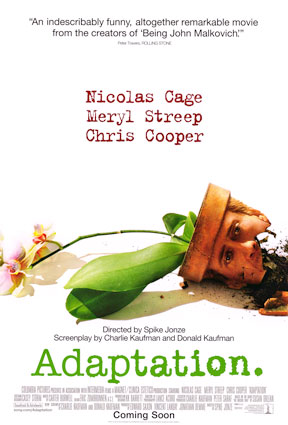
ADAPTATION. (2002) |
| Starring
Nicolas Cage, Meryl Streep, Chris Cooper, Tilda Swinton, Jay Tavare, G.
Paul Davis, Cara Seymour, Stephen Tobolowsky, Gary Farmer, Curtis
Hanson, David O. Russell, Maggie Gyllenhaal, Judy Greer, Ron Livingston,
Brian Cox,
Catherine Keener, John Cusack and John
Malkovich.
Screenplay
by Charlie Kaufman and Donald Kaufman.
Directed by Spike
Jonze.
Distributed by Columbia Pictures. 114 minutes. Rated
R. |
|
Adaptation.
The
mind of Charlie Kaufman is not a pretty place to be. He is probably best known as
the screenwriter of
Being John Malkovich,
a film that was about a portal literally into actor John Malcovich’s brain.
Adaptation,
his follow-up project (again with
BJM
director Spike Jonze)
has no literal portal, but it
is still essentially a view into Kaufman’s mind.
Nicholas Cage plays a
chronically insecure screenwriter not coincidentally named Charlie Kaufman, who after breaking
through by writing the screenplay for a film called
Being John Malkovich
is given the job of writing a film version of a book by a writer for
The New Yorker
named Susan Orlean (Meryl Streep). The book,
The Orchid Thief,
is a lovely but completely uncinematic work about a toothless redneck
(Chris Cooper) who is also a renowned horticulturist who is obsessed
with a rare flower called the Ghost Orchid.
All of this has a woozy
fascinating symmetry because the characters and the situations are all
true. Kaufman’s fitful stops and starts and the self-loathing that
the project and his life inspire in him is funny for general audiences and
at the same time squirm-inducingly realistic to people who have ever had the
experience. Cage also plays Charlie’s twin brother Donald... who, in the
film’s first blatant retreat from
real life... is a totally made-up character. (It is
a show of this film’s skewed worldview that although
Donald Kaufman is
fictional, he still gets a co-screenwriting credit.)
Even though they look
exactly alike, the two brothers couldn’t be more different.
Charlie is a jangled bundle of nerves and neuroses who constantly belittles
himself for being fat, bald and talentless. Donald is
comfortable with his looks, can relate to people, and decides to get into
screenwriting as a whim, in the process grinding out an incoherent serial
killer melodrama that despite a total lack of artistic merit sets off a
bidding war in Hollywood. It’s almost like Donald is the Mozart to
Charlie’s Salieri, except in this twisted view it is the talented artist who
envies the hack.
Cage does a spectacular job of fleshing out two
polarly
different characters, giving them completely separate lives. As Charlie
fails obsessively to make the characters of
The Orchid Thief
into an articulate screen force he inserts himself and his problems into the
script until he finally crosses paths with his protagonists...
both on the page and in real life.
And this is
where the whimsy starts to unravel. In the last
thirty minutes, the film
veers off its course to become like something from one of Donald’s scripts.
I assume (or at least, I hope) that this jump is supposed to be Kaufman and Jonze’s satire on the
formulaic Hollywood moviemaking process – but it flies in the
face of all we’ve seen before… what’s the point in investing yourself in
four of the most original characters in recent celluloid history if they are
going to become somewhat clichéd ciphers in the end? The ending doesn’t
undo all the good that has come before it, though. Even with the flawed
ending, the movie is the most fascinating, imaginative post-modern mind-game
likely to make it into the multiplexes until Kaufman and Jonze work together
again.
(12/02)
Jay
S. Jacobs
Copyright
©2002 PopEntertainment.com All rights reserved.
Posted: February 2, 2003.


|
RETURN TO MOVIE REVIEWS MENU
 

 

Copyright
©2002 PopEntertainment.com All rights reserved.
Posted: February 2, 2003.
|